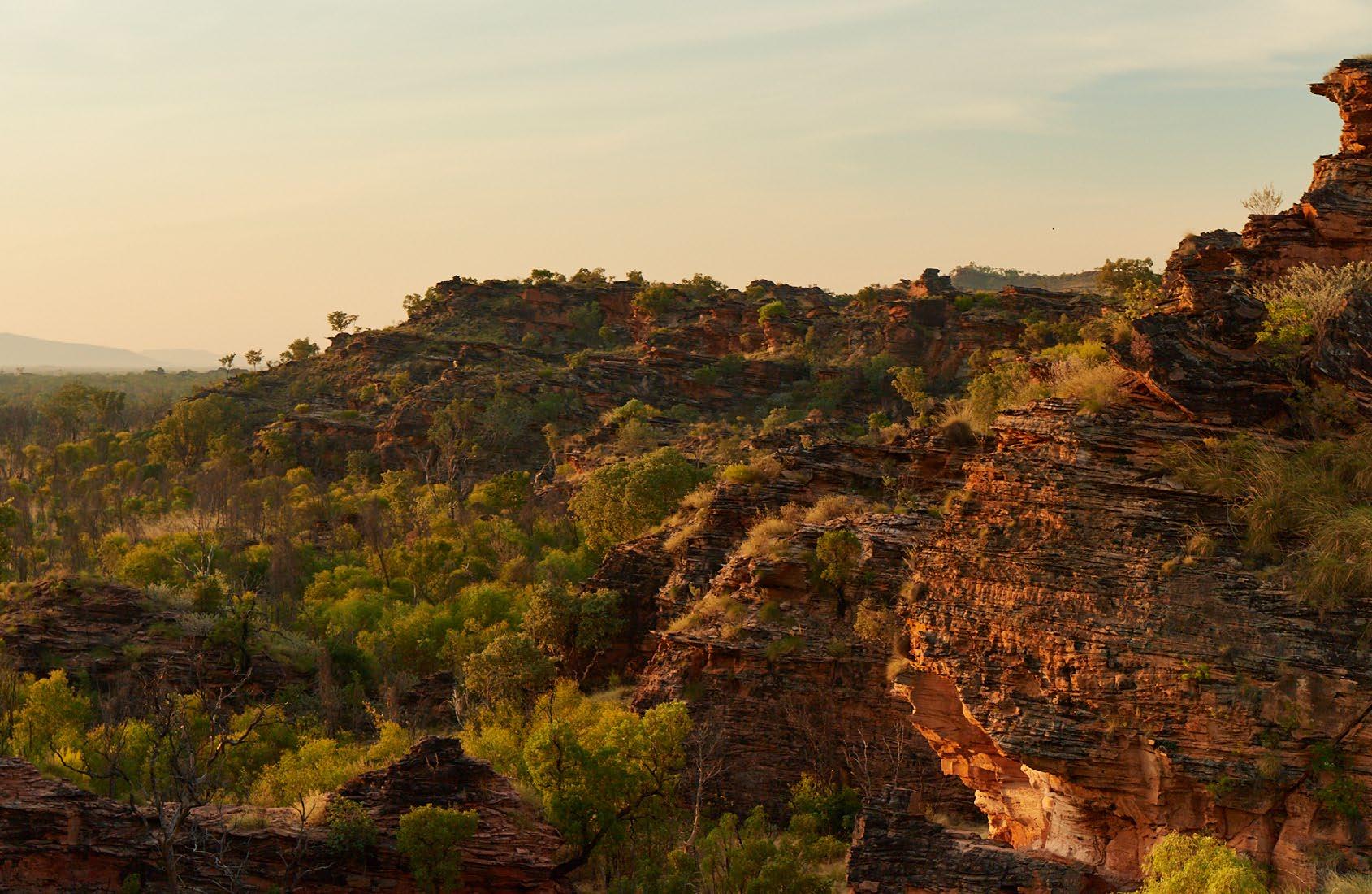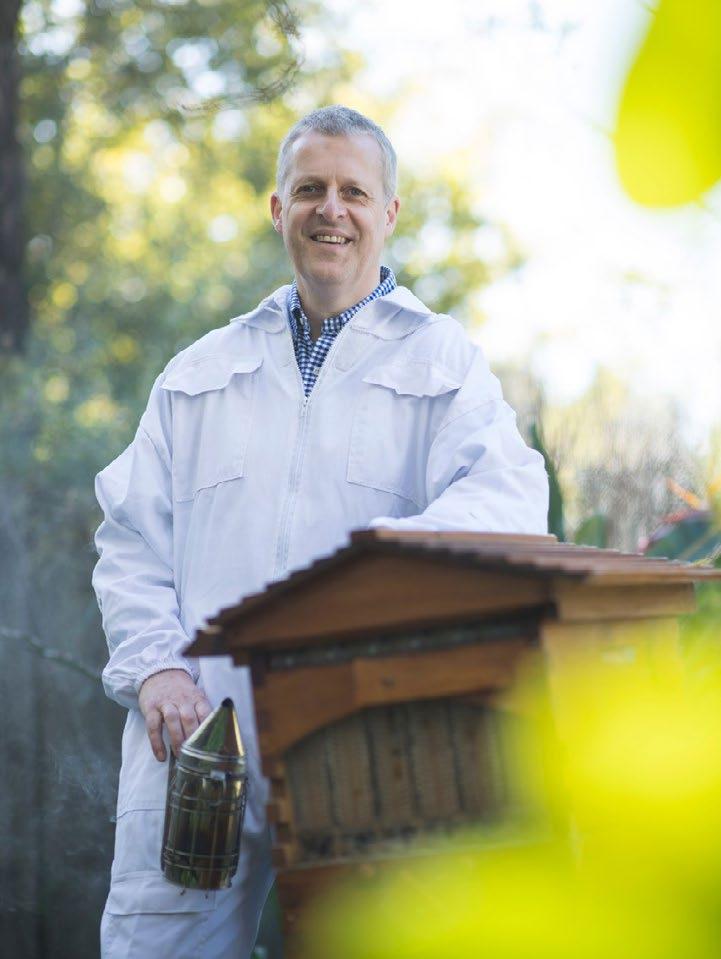
5 minute read
Chapter 4 CEO’s Report
CEO’s REPORT
CEO’s Report
In September, 2021, Botanic Gardens Conservation International (BGCI) published the results of its Global Tree Assessment. This was a 5-year study into the conservation status of every known tree species. The report’s shocking finding was that 30% of all tree species, a huge 17,510 species, are currently threatened with extinction. One of those species is Indian sandalwood (Santalum album), which has been on the ICUN Red List Threatened Species since 1998, and has continued to decline in population since last being assessed by the IUCN in 2018.
Quintis was founded over 20 years ago with the purpose of saving this noble tree, which had been over-exploited for hundreds of years for its precious oil-bearing heartwood. Quintis established plantations, initially around Kununurra, in the beautiful Kimberley region of Western Australia. We planted our first Indian sandalwood tree in 1999 and have been dedicated to growing, managing and sustainably harvesting these trees ever since. Today, our plantation estate extends across the three states and territories of Australia’s far north, consisting of over 5.5 million sandalwood trees, on 12,000 hectares of land.
Our goal is to become the world’s most trusted source of sustainable, ethical and high-quality Indian sandalwood materials used in a myriad of consumer products globally. For this reason sustainability, particularly in reference to plantation management, has always been at the heart of our strategy.
Consumers globally are placing an increasing emphasis on the sustainability credentials of the products they buy. Nowhere is this trend clearer than in the personal care industry, where the growing interest in natural ingredients has coincided with a much broader concern about unethical or unsustainable sourcing practices. The Internet has armed consumers with unprecedented information, allowing them to confidently advocate for products that genuinely meet their standards and expectations. Quintis’ customers – typically the consumer brands or manufacturers of these products – are responding with a demand for transparency which requires suppliers to provide clear evidence of their own supply chain practices and controls.
Indian sandalwood oil is quickly gaining a reputation as an excellent active ingredient in the personal care space, with a range of proven benefits. As a vertically integrated grower and producer, Quintis is able to give its customers absolute and verifiable traceability and certainty about the source, manufacturing, growing practices and social impact of each ingredient. As a keen amateur beekeeper, I am very conscious of the value of preserving our fragile biodiversity. I am proud of the work Quintis has done in the past to save the Indian sandalwood species and about our plans for the future.

In 2021 we reviewed our sustainability strategy, identifying three core themes that will form the pillars of our actions and initiatives into the future. These themes are closely linked to our stakeholders and represent material areas where we can drive a positive outcome for our business, our people, the communities where we operate and the planet.
Carbon:
• Carbon is at the heart of our business. We estimate that our plantations sequester around 195,000t of CO2 every year and that Quintis as a whole, is strongly carbon net negative.
The 2021 Glasgow Climate Change Conference (COP26) sharpened the focus for nations and businesses on greenhouse gas emissions; and while we are proud to be a net absorber of atmospheric carbon, we recognise that we still have opportunities to reduce our emissions across the business. We are committed to measuring and reducing our gross emissions over the lifetime of this plan. • We were delighted that plantation grown sandalwood has been included, for the first time, in the Australian Government’s carbon credits calculation methodology. We expect that this will help to attract more interest in
Sandalwood as a sustainable investment option.
Sustainable Production:
• Our goal is to maximise the efficient use of the resources we need to produce our products. We have already taken great strides to reduce the water and energy used – per kilogram of production – at our oil distillation plant in Albany, and we will look for opportunities to minimise waste across all our operations. Sandalwood is a hemiparasitic tree species which relies on a number of different host trees throughout its life to provide it with much of its water and nutritional needs. As a result of this, each of our plantations is a vibrant multi-species forest, rather than a monoculture. There is a growing realisation in the forestry industry of the benefits of a multi-species plantation, particularly in regards to ecology and forest health.
By caring for and nurturing these forests, we are delivering benefits across multiple dimensions – we create economic value for our customers, team members, suppliers and local communities as well as our shareholders. At the same time, we are acting as responsible stewards of the land and local environment, and contributing to the global effort to reduce atmospheric carbon dioxide.
For Quintis, sustainability is about so much more than Environmental, Social and Governance (ESG) factors. It’s about building a truly sustainable business, which has been our passion, and at the heart of our strategy, for over two decades. We have now reached a scale and level of development where these foundations are delivering real and tangible benefits. We recognise however that there is much more to be done. This report represents a celebration of our achievements to date, but more importantly, our commitment to continuous improvement against the three pillars of our new sustainability strategy.
Community:
• Quintis is a wellbeing company. Our products are renowned for their wellness benefits across physical, mental and spiritual domains.
We care about the wellbeing of all our communities – our customers and consumers, our staff, our partners and our neighbours. • We work in some of the most beautiful and remote regions of Australia. Many of our plantation sites contain areas of high conservation value and/or particular cultural or religious significance to local Indigenous people. We see this as a great privilege and a weighty responsibility to protect and preserve these specific ecosystems and environments alongside local communities. • Wherever we operate, we seek to make a positive impact on the communities and environments that we interact with. We are committed to promoting and role modelling a fairer and more inclusive society. Our sustainability strategy review also included an ongoing commitment to the highest global standard of sustainable and ethical forestry plantation management. To demonstrate this commitment, we are on the path to achieving certification from the Forest Stewardship Council (FSC) which sets standards on products produced from trees, and ensures that the environment and communities were protected during the process.










